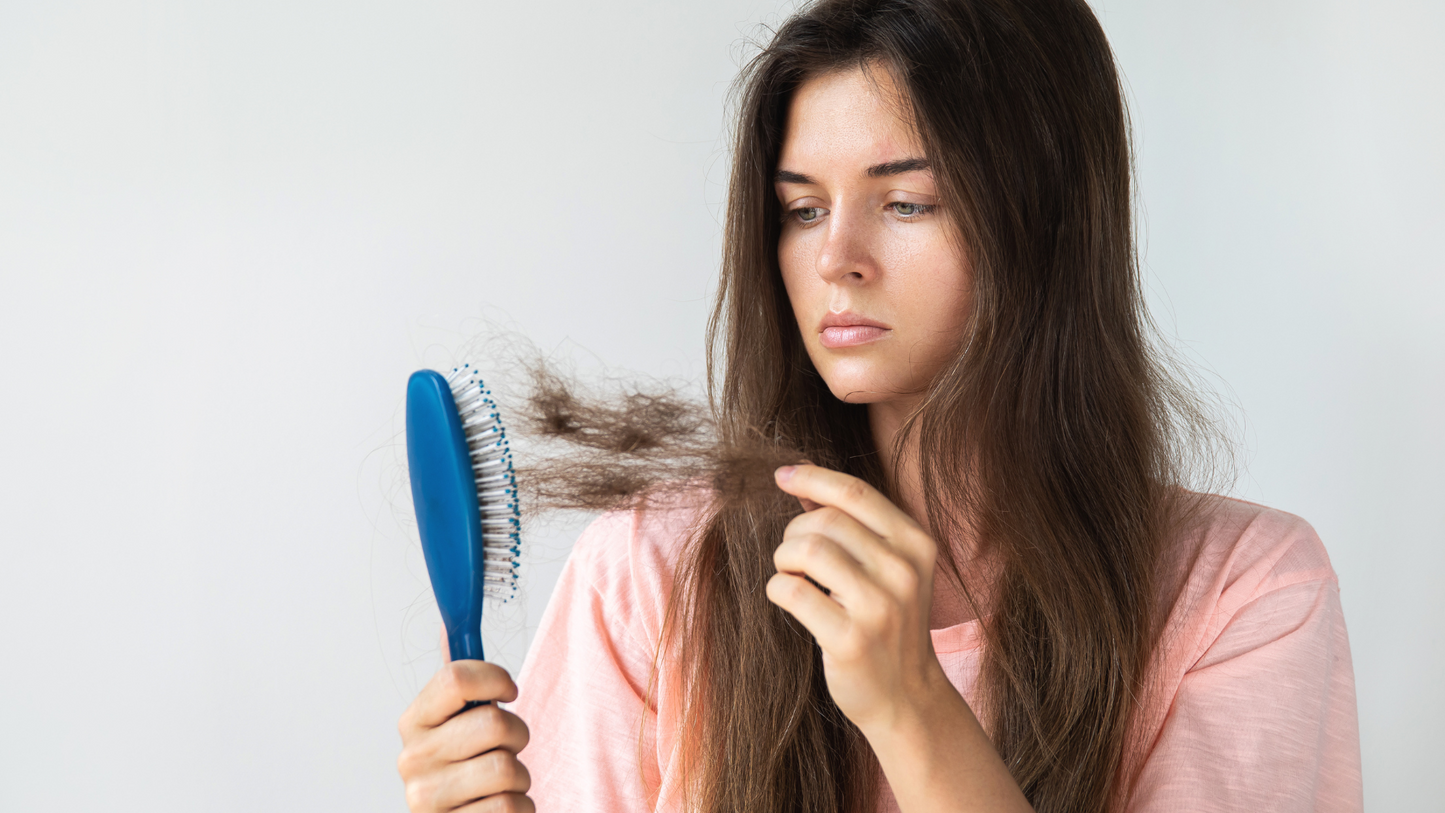
Many new mothers notice clumps of hair on their brushes, in the shower drain, or on their pillows. Postpartum hair loss is extremely common, yet it can feel alarming and isolating. Understanding why it happens, and learning gentle ways to stop or prevent postpartum hair loss, is the first step toward feeling reassured and supported.
Why Hair Falls Out After Pregnancy
After childbirth, the body experiences significant hormonal shifts. During pregnancy, elevated estrogen levels keep hair in a growth phase, which often results in thicker, fuller hair. Once the baby is born, estrogen drops rapidly, pushing more hairs into the shedding phase, known as telogen effluvium.

Normally, only 10-15% of hair is in the shedding phase. Postpartum, this can rise to 30-50%, leading to noticeable hair loss.
Medical sources like the Cleveland Clinic and Johns Hopkins Medicine confirm that this type of hair shedding is temporary and expected. Understanding this can help reduce worry and stress, which in turn can support hair regrowth.
How Long Does Postpartum Hair Loss Last?
Hair shedding typically begins 2-3 months after delivery, often peaking around 4-6 months postpartum. In most cases, hair regrowth begins within 6-12 months.
While some shedding is normal, consult a healthcare provider if you notice bald patches or extreme hair loss beyond a year. Reliable sources like American Academy of Dermatology provide guidance for when professional evaluation is recommended.
Is Postpartum Hair Loss Permanent?
Postpartum hair loss is usually temporary. Hair generally returns to pre-pregnancy density within a year.

Many mothers have found that combining gentle care, proper nutrition, and scalp-supporting products like Atmosphere Scalp Serum helps maintain scalp health and support natural regrowth. These products feature ingredients such as peptides and adaptogens, which can nurture hair follicles without harsh chemicals.
What Can Help With Postpartum Hair Loss?
While there’s no single solution, hair recovery can be supported through nutrition, gentle care routines, and stress management.
Nutrition and Supplements
Hair health relies on essential nutrients:
-
Protein: eggs, fish, legumes, lean meats
-
Iron & Zinc: spinach, lentils, pumpkin seeds
-
Omega-3s: fatty fish, chia seeds
-
Vitamins D & B-complex
-
Adaptogens & Tremella Mushroom: research suggests these may help reduce stress-related shedding (MDPI, 2022)
Ensuring a nutrient-rich diet can help the body prioritize hair regrowth while recovering from pregnancy.
Gentle Hair Care Routine
-
Avoid tight hairstyles like ponytails or braids.
-
Minimize heat styling and aggressive brushing.
-
Use mild, sulfate-free shampoos and lightweight serums, such as Atmosphere Serum, for scalp nourishment.
-
Natural oils and hydrating products can help keep hair strong and healthy.

Stress, Sleep, and Self-Care
Stress and lack of sleep can worsen shedding. Some strategies that support hair health include:
-
Evening rituals with calming magnesium sprays or oils
-
Mindful breathing exercises or meditation
-
Short naps and self-care breaks whenever possible
A calm, well-rested body supports hair recovery and can help prevent postpartum hair loss from becoming more severe.

When to Consider Treatments or Serums
For an extra boost, products like Atmosphere Multi-Peptide Hair Density & Scalp Serum can help support a healthy scalp and encourage the natural hair growth cycle. Many users notice fuller, stronger-looking hair when the serum is combined with a balanced diet and a gentle hair care routine.

While it’s not a magic solution, this serum provides a nurturing, supportive approach that works hand-in-hand with your body’s natural regrowth process, giving your hair the care it deserves during this transitional period.
The Bottom Line - You’re Not Alone
Postpartum hair loss is a natural and temporary process. Many new mothers experience it, and it is generally self-resolving within a year. Focusing on nutrition, gentle hair care, stress reduction, and supportive products like Atmosphere Scalp Serum can help your hair recover while you care for yourself and your newborn.
Luna Nectar is dedicated to providing education, effective products, and gentle guidance to help new mothers navigate postpartum hair changes with confidence and reassurance.
FAQs About Postpartum Hair Loss
Q: How long does Postpartum Hair Loss last?
A: Hair shedding usually lasts 6-12 months and gradually regrows.
Q: Is Postpartum Hair Loss permanent?
A: No, hair typically returns to pre-pregnancy density.
Q: Can Postpartum Hair Loss be prevented completely?
A: Not entirely, but gentle care, stress management, and nutrition may help prevent postpartum hair loss or reduce its severity.
Q: Which ingredients are safe while breastfeeding?
A: Mild shampoos, serums with natural oils, peptides, and adaptogens are generally safe. Always check with your healthcare provider before taking supplements.
Q: What are treatments for postpartum alopecia?
A: While there’s no magic cure, supportive routines, proper nutrition, and products like Atmosphere Scalp Serum can help hair recover naturally.
← Older post Newer post →
